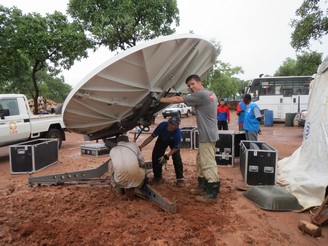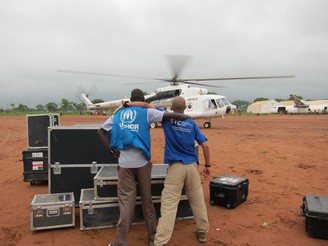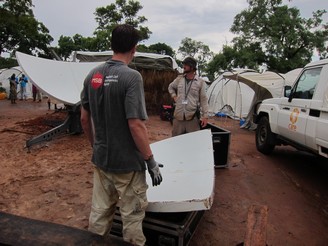
Rain, Rap, Resilience - Emergency Telecommunications in South Sudan
YIDA - “Let it rain over me,” said Haidar Baqir, WFP's emergency telecoms coordinator, citing a song of the same name by his favourite US rap artist, Pitbull.
It was the middle of the rainy season and Haidar was preparing to install an emergency.lu VSAT terminal along with two colleagues, Chris Alagna (RedR Australia) and Magnus Gunnarsson (Swedish Civil Contingencies Agency [MSB]). “The forecast says it's going to rain. But who cares? As Pitbull says: ‘Let it rain over me!’”
As WFP's Deputy Head of ICT in South Sudan and Emergency Telecommunications Cluster (ETC) coordinator, Haidar was in charge of establishing data connectivity in the northern town of Yida, where many thousands of refugees are now living. Doing so required perseverance amid challenging conditions.
Several weeks later, with the rainy season pretty much over, the ETC team still requires determination in order to provide internet connectivity and voice communications services to the humanitarian community on the ground.
It’s a tough operation. The settlement at Yida is home to around 65,000 refugees who have fled fighting in Sudan’s South Kordofan state, and who now face malnutrition, disease and sanitation problems. The ETC enables agencies like WFP, the UN Refugee Agency (UNHCR) and Médecins Sans Frontières (MSF), among others, to coordinate locally and internationally and provide lifesaving services to the refugees.
Yida is a sprawling settlement (it even has a little market set up by its inhabitants) but living conditions for the aid workers (and the 19 Mongolian UN peacekeepers) are fairly cramped. Resources are also limited. There are no buildings in the compound, so shelter, either in the form of tents or tukuls (traditional seating areas), is made with tarpaulin and fences are crafted from dead grass. It is perhaps one of the only places in the world where you can simply build your own office.
“I tried to make a WFP office,” says Sumeet Diwan, the ICT officer on the ground. “I had the fences and everything. We were just waiting for tents.”
The internet café is currently located in the shared UN/NGO compound and is not only essential for conducting operations, it’s also important for keeping in contact with family and friends. “People use Facebook and Skype,” says Sumeet. “But we ask people to stop using it (for entertainment) until after six and everybody’s very respectful of that.”
The end of the rainy season has made equipment installation easier. Electrical systems have also been improved, reducing the risk of electric shocks for aid workers and two radio repeaters have been installed, expanding radio coverage for both handheld and vehicle radios - all of which vastly improves coordination and security.
But the dry weather also puts more pressure on the aid community. As roads reopen, the number of refugee arrivals in the camp rises sharply. As needs rise, the agencies and organisations on the ground will be relying on their communications network all the time. And thanks to the ETC, and Haidar's Pitbull spirit, they shouldn't have to worry.



This article originally appeared on wfp.org